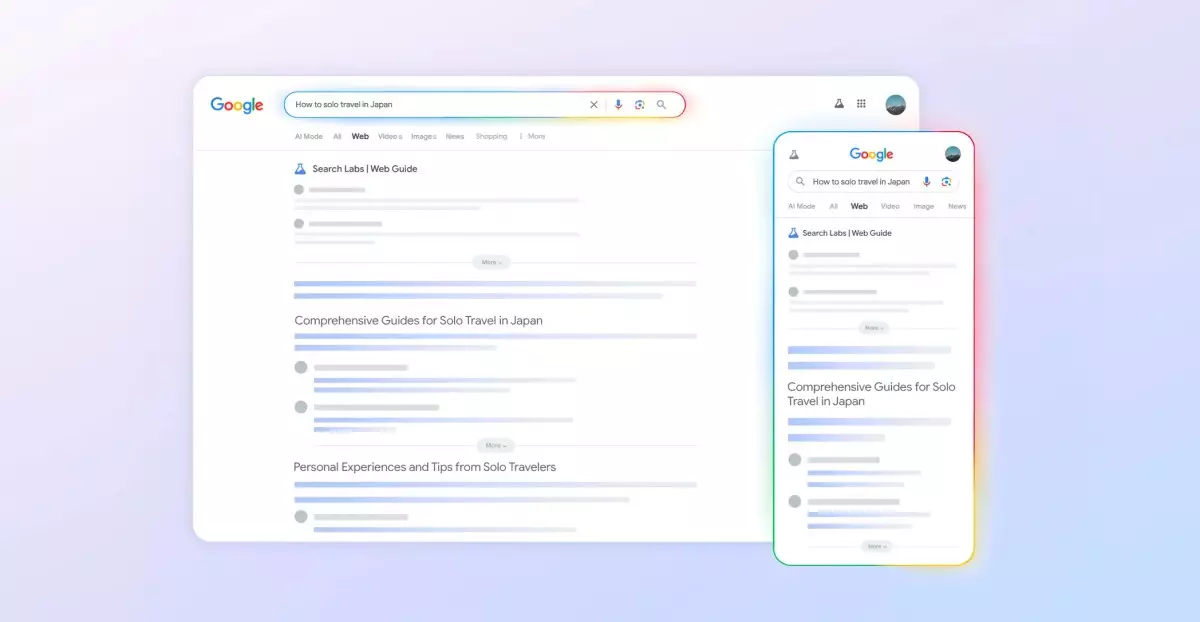The evolution of search engines has always been about improving how we find information. Google, a pioneer in this realm, has continuously refined its algorithms, aiming to make search more intuitive and efficient. The latest innovation, Web Guide, signifies a step beyond traditional search results by leveraging AI to organize and synthesize information dynamically. Instead of the familiar list of blue links that require manual sifting, Web Guide introduces a curated, categorized overview powered by Google’s Gemini AI model. This approach not only streamlines information retrieval but also aligns with a future where artificial intelligence anticipates and meets our informational needs proactively.
Rather than a simple aggregation of links, Web Guide employs AI to break down complex queries, segment results into thematic categories, and generate concise summaries. For instance, when searching for mango tree care, the platform doesn’t just present a handful of links but rather constructs an organized framework including specific guides, troubleshooting tips, and climate considerations. This method reduces the cognitive load on users, enabling quicker access to relevant information, especially for tasks that typically demand deep research or multiple clicks. Such an approach signifies a shift toward an intelligent search assistant that understands context, prioritizes relevance, and offers immediate, educational insights.
Empowering Users with Contextual Depth and Efficiency
One of the most compelling aspects of Web Guide is its potential to deepen user engagement with search results. By categorizing links into distinct sections, it emphasizes the importance of context—helping users navigate the vast ocean of data more effectively. This categorization not only makes the search experience more organized but also inherently educative, as the AI summaries and groupings highlight different facets of the inquiry. For example, inquiring about mango tree care now involves an exploration of climate-specific advice, common issues, and expert insights, all presented seamlessly.
However, despite its promising framework, Web Guide has its shortcomings. The AI-generated descriptions often verge on the obvious, adding little substantive value to what a user might already infer by browsing the listed links. This redundancy hints at a broader challenge: the balance between assistance and verbosity. As AI curates and summarizes, it must avoid diluting the core utility—providing relevant results without unnecessary commentary. Otherwise, it risks becoming a reservoir of superficial summaries rather than an aid for efficient knowledge acquisition.
Moreover, the integration of traditional links alongside AI summaries offers a hybrid experience, appealing to users who prefer direct access to sources. Yet, the real question is whether this new paradigm can replace or, at least, complement the familiar blue links without overwhelming users with information templates that feel cluttered or redundant. For some, this might be an upgrade, but for others, it could complicate the straightforward simplicity of conventional search.
Challenging the Future: Is AI-Driven Curation the Ultimate Solution?
The promise of tools like Web Guide lies in their potential to revolutionize how we interact with the web, but it’s not without controversy. The reliance on AI models trained on large datasets, including content from Reddit and other platforms, raises concerns about accuracy, bias, and source authenticity. Questions emerge about whether AI summaries truly reflect the most authoritative sources or if they simply provide a glossed-over snapshot that omits critical nuances.
Furthermore, this shift toward AI-powered categorization and explanation may inadvertently diminish the role of human-curated content, with curated links from reputable sources like educational institutions, as seen in the mango care example, potentially becoming secondary. Will users start favoring AI-generated snippets over substantial, well-verified articles? And what does this mean for the future of expert authorship and detailed research?
Despite these concerns, the evolution indicates a desire for smarter search experiences—ones that understand context, synthesize multi-faceted information, and save time. Google’s Web Guide is a manifestation of this ambition, aiming to create an efficient, educational, and personalized search ecosystem. Yet, the challenge remains in ensuring that AI acts as a true augmentative tool rather than an oversimplification that compromises depth and accuracy. The success of such innovations depends on how well they can strike that delicate balance and whether users are willing to embrace a hybrid model of AI assistance intertwined with traditional search clarity.

